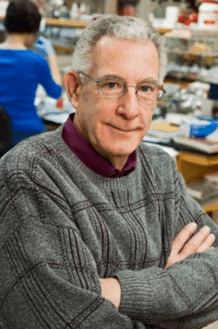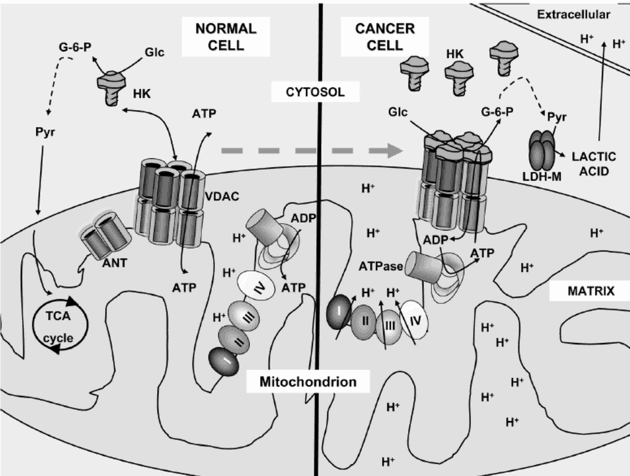
The gene theory of cancer has always struck me as ludicrous.
This theory says that there is damage done to the genes.
Then the damage results in the cell turning into a cancer cell.
But if you look at cancer tumors you realize the awesome complexity of the metabolism of the cancer tumor.
And then there is the fact that these tumors form with awesome complexity.
Then the tumors extend their reach to other organs and other places in the body.
Supposedly, they then colonize outposts which we call metastases.
Anybody that thinks this is a random genetic mutation has to be smoking crack.
There’s much more to it than that.
That’s why this study is perhaps one of the most important studies involving cancer that has ever been done.
It’s actually review rather than a study.
 The researchers are mavericks.
The researchers are mavericks.
 They are willing to go where most researchers are not willing to go.
They are willing to go where most researchers are not willing to go.
Most research goes where the popular theory goes because that’s where the funding is.
And in this case, the funding and the money all flows towards the idea of cancer as a genetic mutation disorder.
Dr. Seyfried is a professor at Boston College, and his web page asks for donations to the College to support his research.
Here are some of his recent publications:
Recent Publications
Maroon JC, Seyfried TN, Donohue JP, Bost J. The role of metabolic therapy in treating glioblastoma multiforme. Surg Neurol Int. 2015 Apr 16;6:61.
Rockwell HE, McCurdy VJ, Eaton SC, Wilson DU, Johnson AK, Randle AN, Bradbury AM, Gray-Edwards HL, Baker HJ, Hudson JA, Cox NR, Sena-Esteves M, Seyfried TN, Martin DR. AAV-mediated gene delivery in a feline model of Sandhoff disease corrects lysosomal storage in the central nervous system. ASN Neuro. 2015 Apr 13;7(2).
Meidenbauer JJ, Mukherjee P, Seyfried TN. The glucose-ketone index calculator: a simple tool to monitor therapeutic efficacy for metabolic management of brain cancer. Nutr Metab (Lond). 2015 Mar 11;12:12.
Akgoc Z, Sena-Esteves M, Martin DR, Han X, d’Azzo A, Seyfried TN.Bis(monoacylglycero)phosphate: a secondary storage lipid in the gangliosidoses.
J Lipid Res. 2015 May;56(5):1006-13.
Heinecke KA, Luoma A, d’Azzo A, Kirschner DA, Seyfried TN. Myelin abnormalities in the optic and sciatic nerves in mice with GM1-gangliosidosis. ASN Neuro. 2015 Feb 18;7(1).
McCurdy VJ, Rockwell HE, Arthur JR, Bradbury AM, Johnson AK, Randle AN, Brunson BL, Hwang M, Gray-Edwards HL, Morrison NE, Johnson JA, Baker HJ, Cox NR, Seyfried TN, Sena-Esteves M, Martin DR. Widespread correction of central nervous system disease after intracranial gene therapy in a feline model of Sandhoff disease. Gene Ther. 2015 Feb;22(2):181-9.
Seyfried TN, Flores R, Poff AM, D’Agostino DP, Mukherjee P. Metabolic therapy: a new paradigm for managing malignant brain cancer. Cancer Lett. 2015 Jan 28;356(2 Pt A):289-300.
Mattson MP, Allison DB, Fontana L, Harvie M, Longo VD, Malaisse WJ, Mosley M, Notterpek L, Ravussin E, Scheer FA, Seyfried TN, Varady KA, Panda S. Meal frequency and timing in health and disease. Proc Natl Acad Sci U S A. 2014 Nov 25;111(47):16647-53.
Seyfried TN, Rockwell HE, Heinecke KA, Martin DR, Sena-Esteves M. Ganglioside storage diseases: on the road to management. Adv Neurobiol. 2014; 9:485-99.
J Lipid Res. 2014 Sep; 55(9): 1815-7.
Mantis JG, Meidenbauer JJ, Zimick NC, Centeno NA, Seyfried TN. Glucose reduces the anticonvulsant effects of the ketogenic diet in EL mice.
Epilepsy Res. 2014 Sep; 108(7): 1137-44.
Meidenbauer JJ, Ta N, Seyfried TN. Influence of a ketogenic diet, fish-oil, and calorie restriction on plasma metabolites and lipids in C57BL/6J mice.
Nutr Metab (Lond). 2014 May 22; 11:23.
Poff AM, Ari C, Arnold P, Seyfried TN, D’Agostino DP. Ketone supplementation decreases tumor cell viability and prolongs survival of mice with metastatic cancer.n Int J Cancer. 2014 Oct 1;135(7):1711-20.
Dufort FJ, Gumina MR, Ta NL, Tao Y, Heyse SA, Scott DA, Richardson AD, Seyfried TN, Chiles TC. Glucose-dependent de novo lipogenesis in B lymphocytes: a requirement for atp-citrate lyase in lipopolysaccharide-induced differentiation. J Biol Chem. 2014 Mar 7;289(10):7011-24.
Seyfried TN, Flores RE, Poff AM, D’Agostino DP. Cancer as a metabolic disease: implications for novel therapeutics. Carcinogenesis. 2014 Mar;35(3):515-27.
Ta NL, Jia X, Kiebish M, Seyfried TN. Autosomal dominant inheritance of brain cardiolipin fatty acid abnormality in VM/DK mice: association with hypoxic-induced cognitive insensitivity. Lipids. 2014 Jan;49(1):113-7.
Ahmed SS, Li H, Cao C, Sikoglu EM, Denninger AR, Su Q, Eaton S, Liso Navarro AA, Xie J, Szucs S, Zhang H, Moore C, Kirschner DA, Seyfried TN, Flotte TR, Matalon R, Gao G. A single intravenous rAAV injection as late as P20 achieves efficacious and sustained CNS Gene Therapy in Canavan mice.
Mol Ther. 2013 Dec;21(12):2136-47.
Poff AM, Ari C, Seyfried TN, D’Agostino DP. The ketogenic diet and hyperbaric oxygen therapy prolong survival in mice with systemic metastatic cancer.
PLoS One. 2013 Jun 5;8(6):e65522.
Bradbury AM, Cochran JN, McCurdy VJ, Johnson AK, Brunson BL, Gray-Edwards H, Leroy SG, Hwang M, Randle AN, Jackson LS, Morrison NE, Baek RC, Seyfried TN, Cheng SH, Cox NR, Baker HJ, Cachón-González MB, Cox TM, Sena-Esteves M, Martin DR. Therapeutic response in feline sandhoff disease despite immunity to intracranial gene therapy. Mol Ther. 2013 Jul;21(7):1306-15.
Arthur JR, Wilson MW, Larsen SD, Rockwell HE, Shayman JA, Seyfried TN. Ethylenedioxy-PIP2 oxalate reduces ganglioside storage in juvenile Sandhoff disease mice. Neurochem Res. 2013 Apr;38(4):866-75.
You see, Seyfried is not a lightweight.
So let’s look at what he and his colleague are saying here in this report.
The major observation is that cancer cells don’t create energy like other normal cells.
Cancer cells generally use an inferior energy creation path called glycogenesis.
Glycogenesis what you used to create energy when your muscles have to create energy to help you run.
It’s not as efficient as how your muscles usually create energy, so they revert after exercise.
But cancer cells use this all the time.
This has been observed since Dr. Otto Warburg, Nobel Prize winner and it’s often called the Warburg effect.
Cancer cells all have
impaired mitochondrial function and energy metabolism.
Cancer cells have some qualities that other cells don’t have.
Cancer cells don’t die the way that other cells do.
Most cells will multiply by dividing.
But after they have divided and divided and divided, they die.
This death is programmed in and is called apoptosis, or programmed cell death.
Cancer cells don’t have programmed cell death or apoptosis.
They just go on living forever.
In fact cancer cells are now cultured in test tubes by scientists who want to research new drugs or new metabolic discoveries.
They do this because the cancer cells can divide and divide forever and never die.
It’s very convenient for science.
It’s not so convenient for our health.
But what about mutations?
Are cancer cells can make cancerous by genetic mutation?
The mutation rate for most genes is low making it unlikely that the numerous pathogenic mutations found in cancer cells would occur sporadically within a normal human lifespan.
Aha! Now we are getting somewhere.
It doesn’t seem like cancer cells depend on mutations at all.
What makes life possible is mitochondria in the cells.
Mitochondria create energy — they’re the energy furnace of every cell.
Without the mitochondria, we would have no energy and therefore no life.
Many studies show that
tumor mitochondria are structurally and functionally abnormal and incapable of generating normal levels of energy.
 And:
And:
The bioenergetic capacity of mitochondria is dependent to a large extent on the content and composition of mitochondrial lipids.
Lipids are a fancy science term for fats.
The mitochondria of cancer cells have different fats in them — and they don’t produce normal types of cardiolipin.
Cardiolipin is a fat that is only produced in healthy mitochondria.
Cardiolipin is vital to the health.
Cancer cells have mitochondria that produce flawed, damaged cardiolipin.
So how does this knowledge let us prevent or treat cancer?
Rational approaches to cancer management can be found in therapies that specifically target energy metabolism.
The first type of therapy is to avoid
exposure to those agents or conditions that provoke tissue inflammation such as smoking, alcohol, carcinogenic chemicals, ionizing radiation, obesity etc.
Here’s how to avoid 80% of the cancer risk.
Simply reducing exposure to cancer risk factors, which produce chronic inflammation and mitochondrial damage, will reduce the incidence of at least 80% of all cancers.
Chronic inflammation is probably the greatest risk factor for cancer.
Chronic inflammation can be identified through a CRP test.
CRP is C-Reactive protein, which the liver produces to manage inflammation in the body.
Inflammation can also be readily identified by observing a number of lifestyle factors.
If you’re obese, if you have heart issues, prostate inflammation, sleep problems, low energy and motivation, and so forth… you have inflammation.
These all are chronic inflammatory states, and they raise the likelihood of getting cancer.
By eliminating inflammation that’s going on in your body, you can reduce the chances of getting cancer by 80%, according to these researchers.
The researchers believe that you’re better off cutting sugar and restricting calories if you already have cancer.
They believe that cancer cells are less likely to grow without the presence of sugar.
And they believe that ketone bodies, which are energy sources from FAT, do not feed cancer.
I do not agree with this.
There are many studies that show cancer relies upon fat consumption even more than sugar consumption.
And it is impossible to eliminate all sugar consumption.
It is possible to restrict sugar consumption, but it is not possible to restrict the production of sugar in the body.
Our bodies produce sugar all the time.
I also think that enough emphasis is not placed on the problem of PUFAs causing cancer.
PUFAs invade the mitochondria and result in massive numbers of free radicals and mitochondrial damage.
I believe that underneath all of this, the dangers of PUFAs are causing more cancers than any researchers are even aware of.
Citations
Cancer as a metabolic disease
http://nutritionandmetabolism.biomedcentral.com/articles/10.1186/1743-7075-7-7
Click for more information on Cancer, for information on Men’s Health, or for more on Cancer reducing lifestyle.
